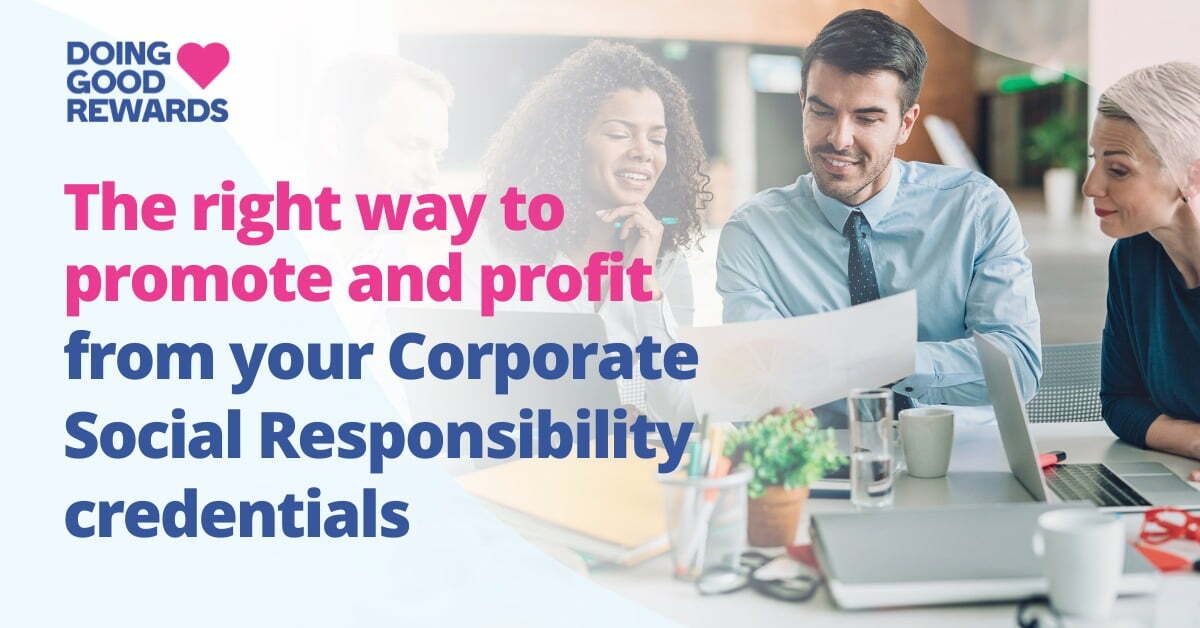
The right way to promote and profit from your Corporate Social Responsibility credentials
In our wonderful modern society, there are plenty of people doing good work and helping others for completely altruistic reasons. They just accept that it’s the right thing to do and do it because they can.
Those who freely give their time to help charitable organisations help those who are less fortunate more often than not have no interest in getting recognition or kudos for their efforts.
Those who help with environmental and community causes also tend to do so simply because they think it’s the right thing to do.
In the business world, there are also some companies that donate in cash or kind, or reduce waste and pollution, and don’t make a song and dance about it.
They should.
If your business is doing good, let the world know. Leverage the positive boost to your brand image for all it’s worth.
Because the better you are at promoting your CSR credentials, the more you can profit from them. And the more you profit from them, the easier it is to not only continue those activities but to expand them, thereby further supporting the community and/or environmental causes.
Here’s how to do it.
Get all your stakeholders on board
Alignment is crucial – at all stages of CSR implementation and execution. You want everyone on board and rowing in the same direction. And you want everyone involved to believe in what you’re doing and why.
Some people see CSR as a form of philanthropy. Others think it’s connected to compliance. While those may be key components, a fully formed CSR program is much more all-encompassing.
A considered CSR program should address how a company manages its social and environmental impacts, as well as its economic contribution. It should affirm that an organisation recognises that it’s accountable to its employees, customers, suppliers, local communities, and society at large.
While it’s nice to think that the prime motivation for any CSR initiative is simply doing the right thing, you need to be realistic and not only admit but also reinforce with your stakeholders that it’s also good for business and good for each of them.
Being upfront about that shows that you value transparency, makes it clear that you know what you’re doing and why, and heads off the prospect of any lingering questions as to why you’re really doing it.
Outline your CSR credentials for all to see
One of the great benefits of making your commitment to CSR initiatives clear and public is that you instantly become a more attractive employer to those of like mind, often individuals with solid ethics and high moral values.
Where once it was the most successful businesses (or the ones who paid the highest wages) that were most likely to attract the best talent, now it’s much more likely to be the most socially and environmentally conscious organisations.
If you’re able to attract employees who share your values and are also the cream of the crop, your business is going to benefit immensely.
Meanwhile, potential partners and investors are also looking for companies that are socially and environmentally conscious, while actively shying away from those who aren’t.
Then, of course, there are the consumers. Studies continue to show that the vast majority of consumers think about the potential impact of their purchasing decisions on the environment.
Global environmental technology company GreenPrint found that nearly 80% of consumers are more likely to purchase a product labelled as environmentally friendly, with 77% of those surveyed saying they’re concerned about the environmental impact of products they buy.
New York University’s Stern Center for Sustainable Business found that 50% of the growth of consumer packaged goods between 2013 and 2018 came from sustainability-marketed products.
Be seen as a community leader
Where choosing to sit it out on the sidelines used to be a reasonable (and fairly widely practised) business response to social, environmental, and political issues, that’s no longer the case.
As reported in a Forbes article earlier this year, the Edelman Trust Barometer – a survey of over 36,000 respondents in 28 countries – declared that, with trust in government and the media at all-time lows, “societal leadership is now a core function of business”.
To quote directly from Dr Jason Wingard’s article:
“If leaders are not convinced that activism makes strategic sense for business and brand, consider the research that validates companies with significant outperformance and profitability levels compared to those that forego adopting CSR strategies. Their reputations are stronger, their customers and employees are more loyal, and their return on investment consistently exceeds expectations.”
In other words, corporate social responsibility is now expected by the market and so is directly tied to profitability.
It follows that failure to get on board – that is, continuing to ‘sit this one out’ – is likely to have an adverse impact on a company’s reputation and turnover.
You certainly don’t want to be standing still while your competitors move forward.
At DGR, we help you develop and promote your CSR program to stand out in the market. Our CSR Audit will provide personalised and detailed guidance on how to grow, measure and report your social impact. Book an initial consultation and get started now.
Recent Posts
- 4 Tips For Communicating Your Social Impact
- Changemaker Consumers: 2023 Trends All Brands Need to Know
- Put your holiday spending to great use this holiday season!
- Stop just giving money to charity and go ‘full CSR’ with purpose
- The right way to promote and profit from your Corporate Social Responsibility credentials
Categories
Click here to email us & we’ll contact you to send more info
Click here to book a 15 min Zoom meeting to find out more
What would you like to do?

Stay ahead of the trends and the competition
Download Free PDF

